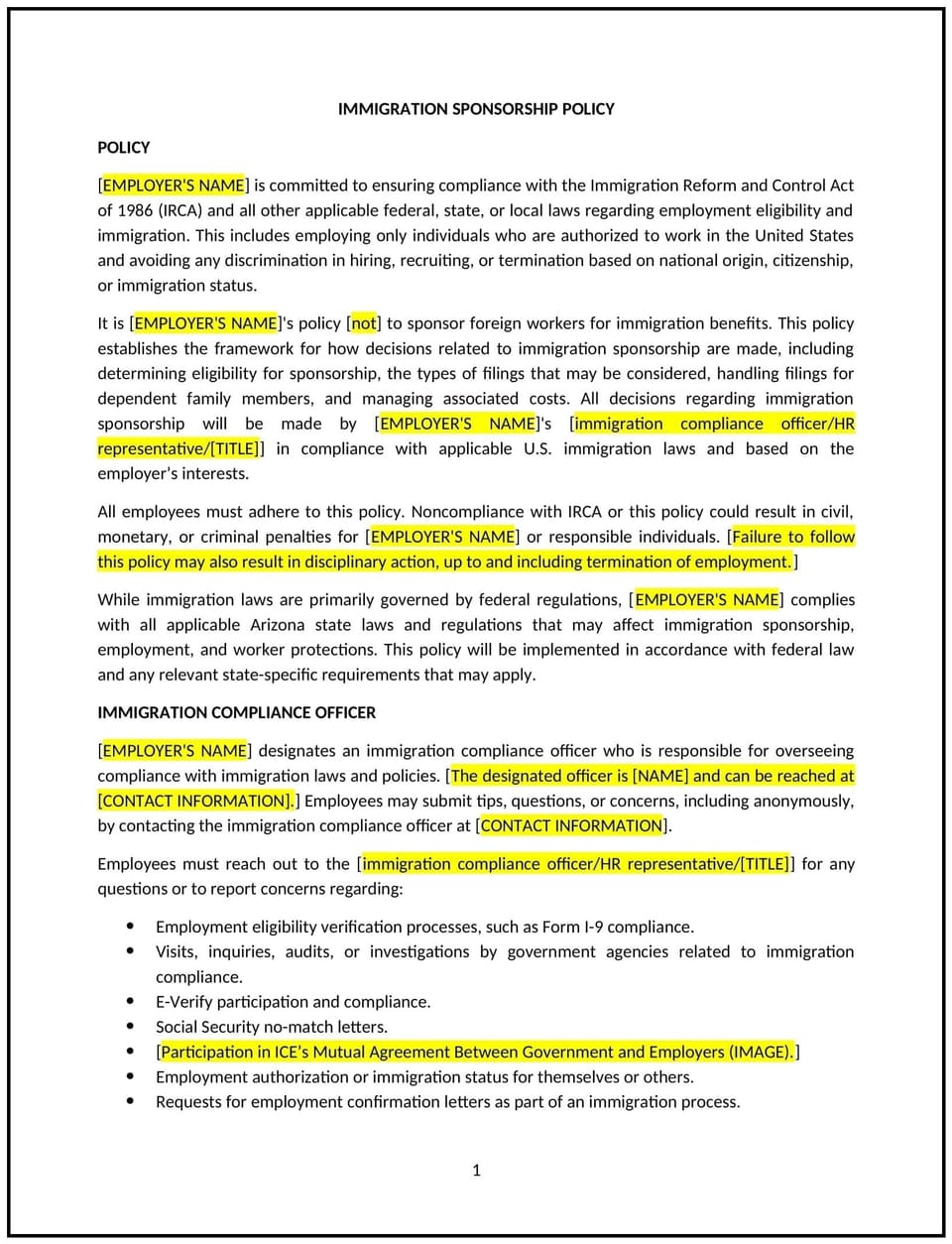Immigration sponsorship policy (Arizona): Free template

Immigration sponsorship policy (Arizona)
In Arizona, an immigration sponsorship policy provides businesses with guidelines for supporting non-U.S. citizens who require employment-based sponsorship to work legally in the United States. This policy outlines the organization’s commitment to fair and compliant hiring practices while adhering to federal immigration laws and regulations.
This policy defines eligibility criteria, the types of sponsorship available, and the procedures for requesting and managing sponsorship. By implementing this policy, Arizona businesses can attract top talent globally while supporting compliance with immigration requirements.
How to use this immigration sponsorship policy (Arizona)
- Define sponsorship eligibility: Specify the roles and qualifications that may qualify for sponsorship based on business needs and immigration requirements.
- Outline sponsorship types: Detail the types of visas the company will sponsor, such as H-1B, L-1, or green cards, and the associated criteria.
- Include application procedures: Provide instructions for initiating the sponsorship process, including documentation and timelines.
- Clarify financial responsibilities: Specify which sponsorship costs the company will cover, such as attorney fees or filing costs, and any employee responsibilities.
- Address post-employment obligations: Outline expectations if the employee leaves the organization during the sponsorship period, such as repayment clauses if applicable.
Benefits of using an immigration sponsorship policy (Arizona)
This policy offers several advantages for Arizona businesses:
- Attracts global talent: Helps recruit highly skilled professionals who require sponsorship, expanding the talent pool.
- Supports compliance: Aligns with U.S. immigration laws, minimizing risks of non-compliance or penalties.
- Enhances transparency: Provides clarity to employees and candidates about the sponsorship process and their responsibilities.
- Promotes fairness: Establishes consistent procedures for evaluating sponsorship requests, reducing potential biases.
- Builds reputation: Positions the organization as an inclusive and supportive employer, appealing to international candidates.
Tips for using an immigration sponsorship policy (Arizona)
- Address Arizona-specific considerations: Reflect the state’s industry needs, such as roles in tech, healthcare, or agriculture, that may require sponsorship.
- Partner with legal experts: Work with immigration attorneys to ensure the sponsorship process is compliant and efficient.
- Educate employees: Provide clear communication about sponsorship timelines, requirements, and limitations.
- Monitor changes: Stay updated on federal immigration policies and adjust the policy as needed to maintain compliance.
- Evaluate costs: Assess the financial implications of sponsorship and set clear guidelines for cost-sharing, if applicable.
Q: Who is eligible for immigration sponsorship under this policy?
A: Eligibility is determined based on the company’s business needs, the role’s qualifications, and the candidate’s ability to meet visa requirements.
Q: What types of visas does the company sponsor?
A: The company typically sponsors visas such as H-1B for specialized occupations, L-1 for intra-company transfers, or permanent residency (green cards) for long-term roles.
Q: What costs are covered by the company during the sponsorship process?
A: The company may cover costs such as legal fees, application filing fees, and associated expenses, as outlined in the policy.
Q: How long does the sponsorship process typically take?
A: Timelines vary based on the type of visa and government processing times but are usually outlined during the sponsorship discussion.
Q: What happens if the sponsored employee leaves the company?
A: The policy may include provisions such as repayment of specific sponsorship-related costs if the employee leaves before completing a set period of employment.
This article contains general legal information and does not contain legal advice. Cobrief is not a law firm or a substitute for an attorney or law firm. The law is complex and changes often. For legal advice, please ask a lawyer.


